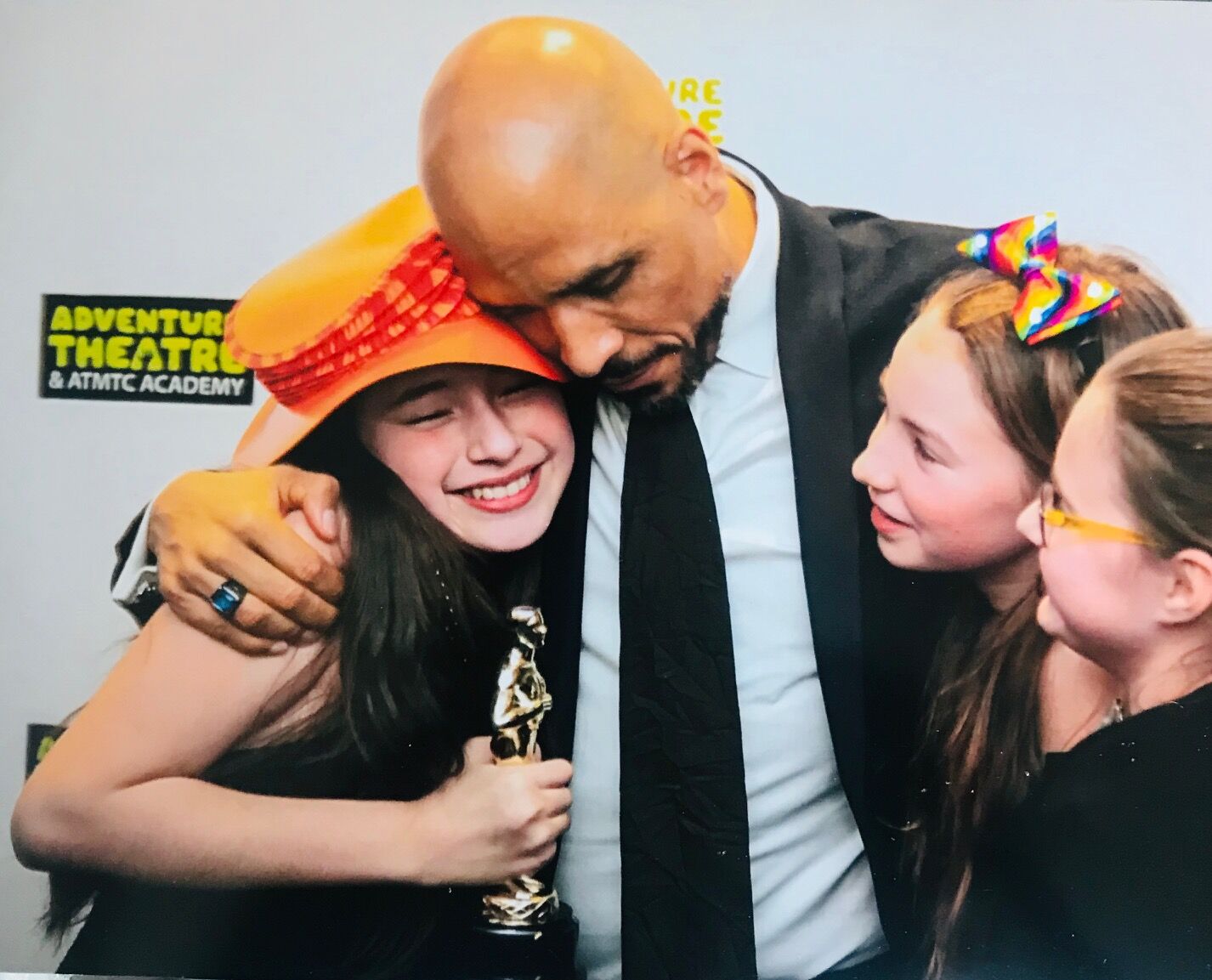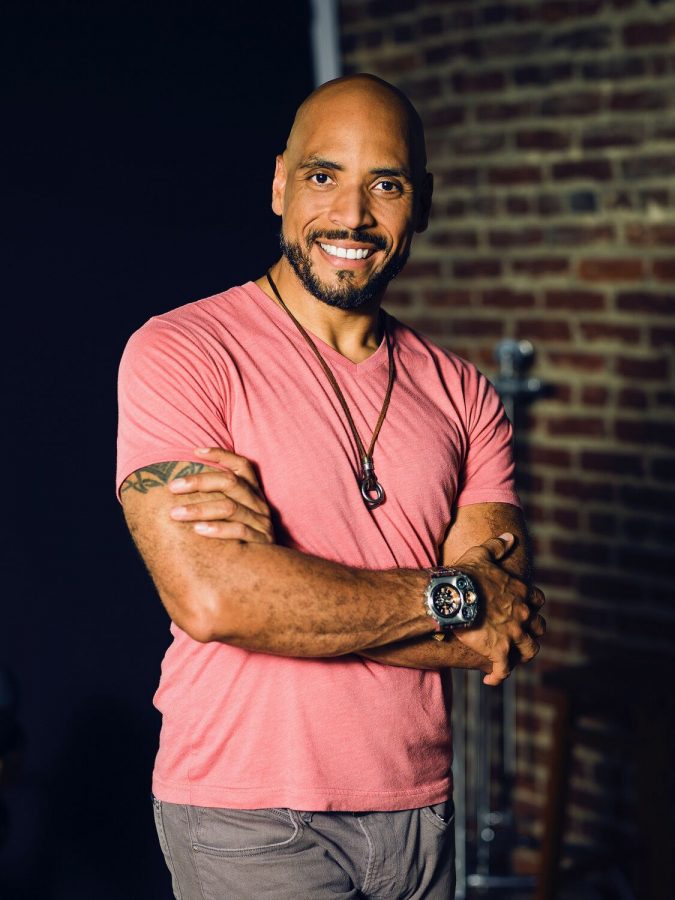Whitman parent Michael Bobbitt steps down as artistic director of Adventure Theater
Artistic director Michael Bobbitt announced his resignation from Adventure Theater, a children’s theater in Glen Echo, last month. After 12 years, Bobbitt said he’s sad to leave but that he’s ready to challenge himself by moving on to directing adult theater. Photo courtesy Michael Bobbitt.
May 8, 2019
When Michael Bobbitt first became artistic director of Adventure Theater in 2007, he saw potential in the volunteer-run community playhouse. It was a small operation: the Glen Echo theater was in minimal debt, had a low budget and only produced five or six different shows annually.
Under Bobbitt’s direction, the theater—which is divided into a theater academy for students grades K-12 and a professional theater productions for adults and children—has transitioned to a professional business model, merged with the Rockville-based Musical Theater Center and has begun featuring shows with entirely minority casts and production teams. After 12 years, Bobbitt is now ready to step down and move onto adult theater as the artistic director at the New Repertory Theatre outside Boston.
Transforming Adventure Theater into a more serious acting academy was a difficult job for Bobbitt, who worked long hours to build the company model from the ground up. In his time at the Theater, Bobbitt professionalized the Board’s policies and established quality benchmarks for hiring professional instructors. He also grew the budget from less than $500,000 to $2.7 million, increased annual patronage by more than 30,000 and established two other locations for the business. The two other locations consist of the theater academy and a shop for creating sets and storing costumes.
Bobbitt estimated that thousands of Whitman students have either attended Adventure Theater for summer camps or acting lessons or have been longtime members of the academy. Senior Allie O’Connor has trained in the academy at Adventure Theater since sixth grade. In her time there, she said she’s seen the program grow immensely under Bobbitt’s direction.
“He’s really helped with getting the word out, helping the image improve, as well as encouraging the students,” O’Connor said. “We have a lot of changes in individual teachers, but he’s always been a consistent face in the program. I’m sad to see him go.”
Bobbitt said his efforts were worth it to build the company into what it is today: a space for children to find their “haven.” Through Adventure Theater, he said he wanted to inspire children to find fulfillment in theater in the same way he did as a child.

“Adventure Theater wants to create the next generation of performers but also create lifelong lovers of theater,” Bobbitt said. “In order for there to be great artists in the world and in theater, you’ve got to get people involved and exposed to it very, very early. That’s what we do.”
Bobbitt has also drawn attention for his insistence on including a more diverse group in every production. A few years ago, Bobbitt instituted a rule that at least half of the season of show’s cast and production team at Adventure Theater must identify as people of color. He said this forces the company to seek out students who otherwise might not come to the theater themselves and ensures the final cast looks more like the real world.
Bobbitt’s focus on inclusion stems from his own family structure: Bobbitt, who is African American and gay, adopted his son, Sang Bobbitt Hanna, from a Vietnamese orphanage.
“[My fiancé and I] are a gay interracial couple raising a Vietnamese child, so inclusion was part of our family and a strict part of who I am,” Bobbitt said. “I became obsessed—and I still am obsessed—with making sure that all of these little kids that look like Michael Bobbitt can get into the door and can participate in theater and the arts too.”
As a director, Bobbitt doesn’t shy away from shows with heavy topics. This year, the company performed “Big River,” which follows Huckleberry Finn as he befriends a former slave his age. Bobbitt worked with the original Broadway playwright and over 100 members of the black community to transform the musical from a 30 person three-hour show to an eight-person one hour show.
Bobbitt’s focus on inclusion extends beyond just racial diversity: every show produced at Adventure Theater performs at least one sensory-friendly version for audiences with autism, Asperger’s Syndrome and other sensory issues. These performances involve adjusting the sound levels and keeping the house lights turned on to create a more comfortable experience for the audience. In 2010, Bobbitt worked with Disney Theatricals to expand an autism-friendly version of “The Lion King” to Broadway. Bobbitt said he wants to include as many people from a diverse array of backgrounds as he can in theater.
Although Bobbitt is moving on to adult theater, he said he won’t forget the importance children’s theater has to him and to the greater theater community.
“I think children’s theater is the most important theater in the country, and I think children are the most important people in the country,” Bobbitt said. “Children’s theater gets marginalized and left out of conversations when it should be the beginning of all the conversations. If we are to have great art for adults, it has to start with kids.”
Bobbitt said that he’s ready for a “new challenge” in becoming New Repertory Theatre’s artistic director. But even though he feels the timing is right, he’s still nervous to no longer work at a children’s theater, he said. His new theater currently puts on only one family-friendly musical a year, and it has been more than a decade since Bobbit has worked with only adults.
He said his goals for the New Repertory Theater are the same ones he had with Adventure Theater: “to do more work in equity, diversity and inclusivity, and to just have fun.”
With each show he produces, he tries to create the highest quality productions to create “lifelong lovers of theater” amongst his students, Bobbitt said.
“Seeing kids’ faces and seeing what happens when they witness great theater, either by learning something new or singing and dancing or watching something on stage that just excites them is visceral, and there’s nothing like it in the world,” Bobbitt said. “I want people to say at my funeral that Michael Bobbitt strove to make great theater, and he accomplished it.”










